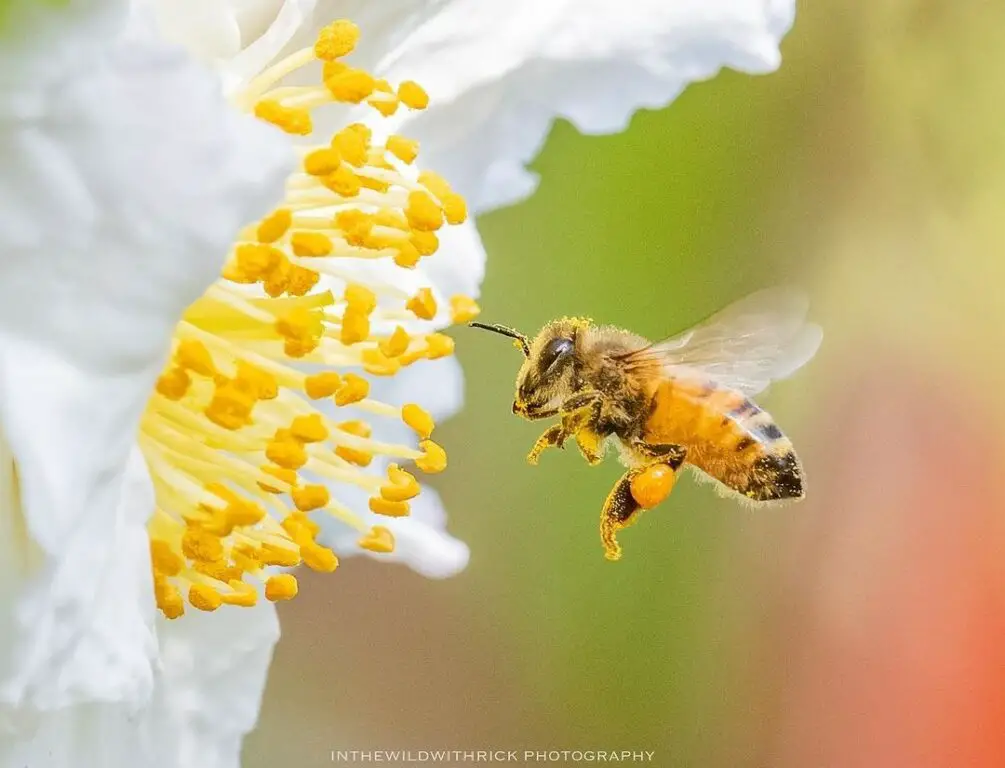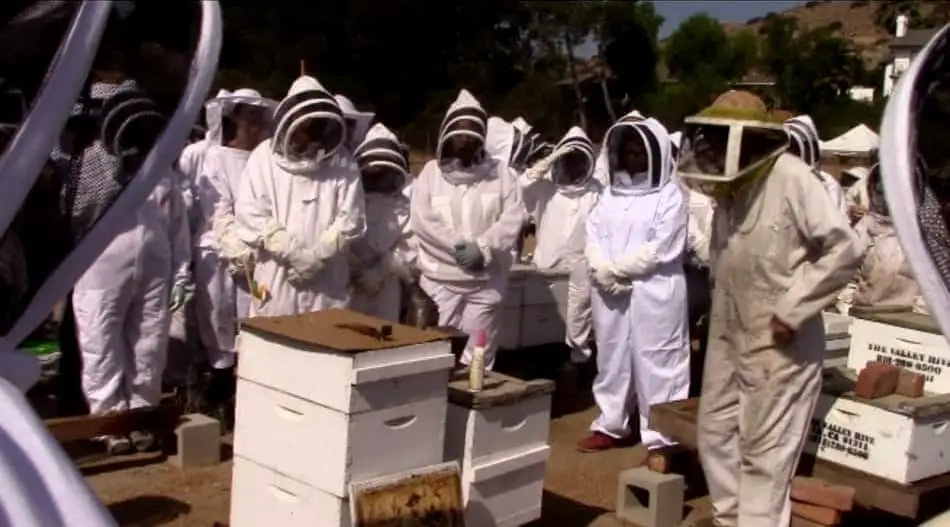This post contains affiliate links.
Welcome to the buzzing world of beekeeping, a unique hobby that holds immense significance for our environment. As guardians of biodiversity, bees are tireless pollinators, essential for the proliferation of numerous plant species and the stability of ecosystems. This introductory glimpse will explore the intricate web of benefits bees contribute to the environment, underscoring why beekeeping is not just a pursuit of passion but a vital endeavor towards sustaining the delicate balance of nature. Join us as we delve into the wondrous impact of bees on biodiversity!
The Importance of Beekeeping in Mitigating Climate Change
When it comes to combating climate change, the role of bees can’t be overstated. These little pollinators are absolutely vital to the health of our ecosystems. It’s a fact that bee species play a crucial part in the propagation of countless plants, contributing to the biodiversity that’s essential for balanced ecosystems.
Beekeeping, therefore, becomes an environmentally important practice as it supports the survival and proliferation of bees. Given the decline in bees due to various environmental stressors, beekeeping helps in preserving these key species which, in turn, aids in maintaining the environmental equilibrium.
Bees are tireless workers, their foraging and pollination activities help plants to thrive, which is pivotal for absorbing carbon dioxide, a significant greenhouse gas contributing to climate change.
Moreover, bees support the growth of fruits, vegetables, and nuts, which are crucial for human consumption, not to mention the plants that feed the animals we rely on. Therefore, the relationship between bees, biodiversity, and climate change is deeply interconnected. The preservation of bees and the encouragement of beekeeping practices become as important as other direct actions against climate change.
Beekeepers, by ensuring the health and longevity of bee populations, directly contribute to the robustness of our ecosystems and the broader capacity of the environment to respond to climate threats. In addition, they provide a network of ecological support, nurturing diverse bee species that, in turn, foster a variety of plant species, enhancing overall environmental resilience.
It’s clear, then, that bees are more than just producers of honey; they are indispensable allies against climate change. Beekeeping not only sustains the existence of these incredible insects but also reinforces the natural processes that bolster environmental health.
With each hive that’s maintained, beekeepers bolster an army of bees that are critical in the fight against climate change, making beekeeping an endeavor that’s as important as it is rewarding. As custodians of these marvellous creatures, beekeepers ensure that the crucial connections within ecosystems are not broken, emphasizing how essential these buzzing beings are to our planet’s future.

Photo by: InTheWildWithRick
Related Articles:
- The Beginner’s Guide to Backyard Beekeeping: A Beginners Guide & Tips for the Aspiring Backyard Beekeeper
- 5 Essential Benefits of Starting Beekeeping: Best Reason to Start Backyard Beekeeping for Beekeepers
- How to Tell If Beekeeping Is Right for You: Signs You’re a Good Beekeeper
- The History of Beekeeping: A Fascinating Journey for Bees and Beekeepers
- Understanding the Role of Bees in Our Ecosystem: Importance of Bees in the Environment
- Essential Equipment for Starting Your Hive: Beekeeping Tools & Gear | Beekeeping Equipment for Beginners
- Common Myths About Beekeeping Debunked: Beekeepers Expose Misconceptions & Bee Myths
- Understanding Bee Behavior: What New Beekeepers Must Know – Learn Honeybees and Beekeeping
Supporting Wild Plant and Native Bee Populations
The vitality of our planet’s health is heavily dependent on the relationship between bees and biodiversity. Supporting wild plant growth is a significant environmental contribution made by bees, acting as agents of pollination, essential to the survival of diverse ecosystems. Robust wild plant populations offer sustenance and shelter to countless species, ensuring that native bee populations thrive.
These native bees, in turn, provide indispensable pollination services that many wild plants rely on to reproduce and maintain genetic diversity.
It’s not just honeybees that are the heroes of our environment; native bee populations, including bumblebees, solitary bees, and others, are vital too. They are perfectly adapted to their local environments and therefore play a major role in supporting local flora.
Each buzz and flutter contributes massively to sustaining native plant communities, which is good for the environment and good for us. These bee populations are a lynchpin in the chain of ecosystem services, whereby they support other wildlife, from insects to larger animals, by maintaining the habitats they all share.
Moreover, bees transcend being simply benefactors of our environment; they are truly environmental architects. Through their diligent pollination services, they stitch together the tapestry of biodiversity that blankets our precious earth.
A single bee colony can visit millions of flowers in a year, which is a testament to just how integral bees are to sustaining ecosystems. The interdependence between bees, wild plant populations, and biodiversity is a delicate dance, and beekeeping plays a pivotal role in ensuring that this dance continues unabated.
As enthusiasts interested in promoting bees and their undeniable benefits to our environment, we must recognize the gravity of our role. Beekeeping supports these crucial pollinators by offering them safe havens and ample resources, thereby bolstering bee populations and, by extension, the health of our ecosystems.
By fostering a symbiotic relationship with bees, we aren’t just cultivating hives; we’re nurturing the biodiversity that keeps our environment bustling with life and energy. And that’s something truly good for every living creature on this planet.

Beekeepers: Guardians of Biodiversity and the Environment
When you envision beekeepers, imagine them not just as hobbyists or producers of sweet honey, but truly as staunch guardians, actively preserving the environment we hold dear. The environmental benefits of their passion are vast, echoing through the intricate networks that compose our precious biodiversity.
Each time a bee forages and pollinates, it becomes a vital cog in the machinery of the ecosystem—without bees, the colorful tapestry that is our world would begin to unravel. Acknowledging the reality that bees are crucial to biodiversity feels necessary, given their role in sustaining the ecosystems around us.
A healthy bee population is synonymous with a thriving environment, a fact that underlines the importance of beekeeping and environmental conservation efforts.
Bees are environmental agents of pollination, injecting life into countless plants that support not only our nutritional needs but also that of wildlife. Their tireless work is vital to ensuring the survival and propagation of numerous flora species, which in turn strengthens ecosystem resilience. Beekeepers, therefore, are truly environmental stewards, nurturing the bees that in turn nurture the land.
Beekeeping, practiced diligently and with respect to natural processes, consequently supports wild plant and native bee populations, representing a mutualistic relationship between human action and nature’s balance. This underscores why beekeeping is not just a hobby or a profession; it’s a crucial, necessary, and important task that intertwines with the fabrics of environmental health.
As these apiarists tend to their hives, they’re also tending to the very foundations of our environmental structure, ensuring that bees continue their benefits to the intricate and diverse ecosystem.
Beyond the hive, beekeepers also play a significant role in environmental education, sharing their knowledge about bees’ benefits, the importance of bees, and how intricate their relationship with the environment is. Speckled with lessons on ecosystem services that bees provide, such as plant pollination and crop yield improvement, the narrative of beekeeping helps bind communities together in a shared concern and care for the environment.
Beekeeping is not simply a pastime; it’s a profoundly important vocation that stitches together the vibrant quilt of our environment, keeping the very essence of biodiversity intact. Truly, these guardians of biodiversity are embarking on a duty that is nothing short of heroic for our planet’s health.
How beekeeping sustains biodiversity and helps the environment
- Pollination of Wild Plants: Honeybees play a crucial role in pollinating a wide variety of wild plants, helping to maintain the health and diversity of natural ecosystems.
- Supporting Food Webs: By pollinating flowers, honeybees help produce seeds and fruits that serve as food for a myriad of other wildlife, supporting complex food webs.
- Genetic Diversity in Agriculture: Honeybees pollinate many agricultural crops, promoting cross-pollination and contributing to the genetic diversity of these plants.
- Ecosystem Resilience: The pollination services provided by honeybees enhance plant community resilience by ensuring reproductive success and fostering diverse plant populations.
- Habitat Creation: The nesting and foraging activities of honeybees can contribute to habitat creation and maintenance for other species, such as cavity-nesting birds.
- Soil Health: Through their search for nectar and pollen, honeybees help in the dispersal of plant material, which can decompose and enrich soil, benefiting overall plant growth.
- Maintaining Flowering Plant Populations: Honeybees are essential in keeping many species of flowering plants in existence, thus preserving the aesthetic and ecological value of various landscapes.
- Indicator Species: Honeybees serve as an indicator species, providing insights into the health of an ecosystem due to their sensitivity to environmental changes.
- Medicinal Resources: Some plants that honeybees pollinate have medicinal properties and contribute to biodiversity by providing various health benefits and therapeutic resources.
- Cultural Significance: Honeybees have a cultural and spiritual significance in many societies, which fosters an appreciation for biodiversity and encourages conservation efforts.
Bees and Nature: Understanding the Critical Importance of Honeybees
When we delve into the extraordinary world of bees and nature, it’s like uncovering a secret garden where every blossom resonates with the energy of these tireless pollinators. Understanding the critical importance of honeybees becomes not just a matter of curiosity but of utmost urgency.
These humble insects are paramount to our survival, providing us with bountiful harvests and preserving the delicate balance of our ecosystems. Beekeeping is not just a pastime; it’s a way of protecting the guardians of our food security. Honeybees, as part of the great tapestry of biodiversity, are masters of pollination, ensuring that from apple orchards to almond groves, nature’s bounty is sustained.
It’s no exaggeration to claim that bees are part of the biodiversity that breathes life into the Earth.
Without them, it takes more than soil and water to bring forth the harvest. Bees play an important role in the maintenance of biodiversity, fertilizing flowers and enabling them to set seed and fruit. This process enhances food security, as a vast majority of the crops we rely on for nutrition depend on pollinators.
Far from being a niche interest, beekeeping can diversify livelihood opportunities for men and women in rural areas, creating communities resilient against the unpredictable threats of climate change. Furthermore, bees are crucial pollinators that uphold the structures of wild ecosystems, supporting plant diversity and the wildlife that depends on it.
Beyond their role in nature, bees symbolize a connection, reminding us that it’s good for the environment when we live in harmony with other creatures. With every frame of honey harvested and every new colony established, beekeeping enhances food security within planetary boundaries.
By nurturing bees, we secure not only our sustenance but also the nourishment of generations to come. The importance of these small yet mighty insects cannot be overstated. They’re not simply buzzing in our gardens; they’re keeping the very essence of life thriving. Isn’t it time we acknowledged the full scale of what bees do for us and the planet?
For more information on beekeeping, see my other articles on beekeeping.
Frequently Asked Questions
Q: Why is beekeeping considered an important environmental endeavor?
A: Beekeeping is vital for the environment because it supports bee populations that are essential pollinators for many plant species. This in turn maintains ecosystem stability and biodiversity, aiding in absorption of carbon dioxide and combating climate change. Additionally, beekeeping bolsters food security by aiding the production of fruits, nuts, and vegetables. Thus, it’s not just a hobby, but a crucial part of sustaining ecological balance and helping our planet’s health.
Q: How do bees contribute to combating climate change?
A: Bees are powerful agents in mitigating climate change by enhancing plant growth, which in turn absorbs carbon dioxide from the atmosphere. Their pollination services ensure the proliferation of a diverse range of plants, which helps maintain the balance of ecosystems necessary for the environment to adapt to and combat climate threats.
Q: Why are both honeybees and native bee species important for the environment?
A: While honeybees are widely recognized for their pollination services, native bee species such as bumblebees and solitary bees are also crucial. They are perfectly adapted to their local ecosystems and provide essential pollination for local flora, contributing significantly to biodiversity and the sustenance of native plant communities. This diversity in bee species helps support a wide range of wildlife and maintains the balance of various ecosystems.
Q: Can beekeeping have a positive impact on biodiversity and if so, how?
A: Absolutely! Beekeeping has a positive impact on biodiversity by ensuring the survival of bees, which in turn promotes the pollination and growth of diverse plant species. This leads to robust plant populations, providing food and shelter for many different types of creatures and contributing to the genetic diversity essential for ecosystems to thrive.
Q: What is the relationship between beekeeping, bees, and food security?
A: Beekeeping is directly linked to food security as bees are paramount pollinators for crops we depend on for food. A large variety of crops need bees to fertilize flowers, allowing them to produce fruit and seeds. By supporting bee populations through beekeeping, we ensure the continuation of these vital ecological processes, thereby securing our own food supply as well as that of future generations.
Thanks For Being A Beekeeper!
Backyard Visitors participates in affiliate programs which compensate us for referring traffic.

